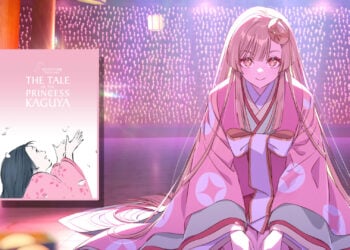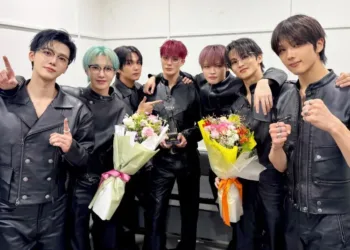Warner Bros. Pictures has dropped the explosive first trailer for “The Bride,” Maggie Gyllenhaal’s audacious reimagining of the Frankenstein legend that promises to redefine monster cinema for a new generation. The trailer showcases Christian Bale’s transformative performance as Frankenstein’s monster alongside Jessie Buckley’s fierce portrayal of his reanimated companion in what appears to be a punk rock fever dream set against 1930s Chicago.
Table of Contents
Revolutionary Take on Classic Horror
The Bride trailer immediately establishes Gyllenhaal’s bold departure from traditional Frankenstein adaptations. Rather than Gothic castles and European countryside, this version transplants the legendary tale to Depression-era Chicago, creating a unique blend of period drama and supernatural horror that feels both timeless and startlingly contemporary.

| The Bride Production Details | Information |
|---|---|
| Director | Maggie Gyllenhaal |
| Lead Stars | Christian Bale, Jessie Buckley |
| Setting | 1930s Chicago |
| Release Date | March 6, 2026 |
| Studio | Warner Bros. Pictures |
| Budget | $80 million |
The film’s official synopsis reveals a compelling narrative: “A lonely Frankenstein travels to 1930s Chicago to seek the aid of a Dr. Euphronius in creating a companion for himself. The two reinvigorate a murdered young woman and the Bride is born. She is beyond what either of them intended, igniting a combustible romance, the attention of the police and a wild and radical social movement.”
Christian Bale’s Monstrous Metamorphosis
The trailer reveals Christian Bale’s complete physical and emotional transformation into Frankenstein’s monster. Gone is the hulking, inarticulate creature of previous adaptations. Instead, Bale presents a sophisticated, emotionally complex being capable of deep longing and dangerous obsession. His performance appears to blend the psychological intensity he’s known for with the physical demands of playing literature’s most famous monster.

First-look photos released by Gyllenhaal in April 2024 showed Bale in full Frankenstein makeup, revealing the extensive prosthetics and character work that went into creating this new interpretation. The trailer builds upon these glimpses, showing Bale’s monster as both vulnerable and threatening, capable of tenderness and violence in equal measure.
Jessie Buckley’s Fierce Bride
Jessie Buckley’s portrayal of the titular Bride represents perhaps the film’s most radical departure from source material. Unlike the brief, voiceless appearance of the Bride in James Whale’s 1935 “Bride of Frankenstein,” Gyllenhaal’s version gives the character agency, personality, and a fierce independence that drives the narrative forward.

The trailer showcases Buckley’s character as far more than a mere companion. Her Bride is a force of nature—unpredictable, powerful, and completely unwilling to fit into anyone’s predetermined expectations. Buckley’s performance appears to channel both vulnerability and raw power, creating a character who is simultaneously victim and victor in her own resurrection story.
Star-Studded Ensemble Cast
Beyond the central duo, “The Bride” boasts an impressive ensemble cast that adds gravitas and complexity to the narrative. The supporting cast includes:
| Cast Member | Role |
|---|---|
| Annette Bening | Dr. Euphronius |
| Penélope Cruz | Myrna |
| Jake Gyllenhaal | Supporting role |
| Peter Sarsgaard | Key character |
| Julianne Hough | Supporting role |
This stellar lineup suggests that Gyllenhaal has crafted a story with multiple layers and complex relationships that extend far beyond the central monster romance.
Maggie Gyllenhaal’s Directorial Evolution
Following her critically acclaimed directorial debut “The Lost Daughter,” which earned three Academy Award nominations, Gyllenhaal has chosen to explore radically different territory with “The Bride.” The film represents a dramatic shift from intimate character study to large-scale genre filmmaking, showcasing her versatility as a filmmaker.
Gyllenhaal’s approach appears to blend high art with popular entertainment, creating what early descriptions call a “punk rock” take on the Frankenstein mythology. The trailer suggests influences ranging from “Bonnie and Clyde” to “Wild at Heart,” positioning the film as both a monster movie and an outlaw romance.
Production Journey and Creative Vision
The film’s production journey reflects Gyllenhaal’s commitment to creative control and artistic vision. Originally developed at Netflix, “The Bride” moved to Warner Bros. after the streaming service and Gyllenhaal disagreed over filming locations and creative decisions. This move ultimately allowed for a larger budget and theatrical release strategy that better serves the film’s ambitious scope.
Technical Excellence
The production team includes industry veterans who bring significant credentials to the project:
- Cinematographer: Lawrence Sher (“Joker”)
- Costume Designer: Sandy Powell (“Cinderella”)
- Production Designer: Karen Murphy (“Elvis”)
- Composer: Hildur Guðnadóttir (replacing Jonny Greenwood)
- Editor: Dylan Tichenor
This team suggests a commitment to both visual spectacle and emotional authenticity that should elevate “The Bride” above typical genre fare.
Thematic Depth and Social Commentary
The trailer hints at themes that extend far beyond traditional horror tropes. Set against the backdrop of 1930s America, the film appears to explore issues of identity, agency, and social upheaval. The synopsis mentions “a wild and radical social movement,” suggesting that the Bride’s resurrection catalyzes broader cultural transformation.
Gyllenhaal’s previous work demonstrates her ability to weave complex social commentary into compelling narratives, and “The Bride” appears to continue this tradition within the framework of monster cinema.
Competition in the Frankenstein Market
“The Bride” arrives as part of a renewed interest in Frankenstein adaptations. The film will compete with Guillermo del Toro’s “Frankenstein” on Netflix, starring Jacob Elordi, Oscar Isaac, and Mia Goth. However, the two films appear to offer distinctly different approaches to the source material, with del Toro’s version embracing Gothic horror traditions while Gyllenhaal’s takes a more contemporary, subversive approach.
This competition could benefit both films by generating broader interest in Frankenstein stories while allowing each to find its distinct audience.
Release Strategy and Expectations
Warner Bros. has positioned “The Bride” as a major theatrical event, scheduling it for March 6, 2026, with IMAX presentations. The March release date moves the film away from Halloween season competition while positioning it as an early-year blockbuster that could benefit from reduced competition.
The studio’s confidence in the project is evident in both the substantial marketing push and the decision to move the film from streaming to theatrical distribution, recognizing its potential as a cinematic experience that demands the big screen treatment.
Industry Impact and Legacy Potential
“The Bride” represents more than just another horror film—it’s a statement about the potential for genre cinema to tackle serious themes while delivering spectacular entertainment. Gyllenhaal’s involvement brings art house credibility to monster movie traditions, potentially opening new avenues for sophisticated horror filmmaking.
The success of “The Bride” could influence how studios approach classic monster properties, encouraging more innovative and female-driven interpretations of traditionally male-dominated stories.
The trailer for “The Bride” promises a revolutionary take on classic horror that combines Christian Bale’s transformative performance with Maggie Gyllenhaal’s unique directorial vision. As March 2026 approaches, anticipation continues to build for what could be one of the year’s most significant cinematic events.
FAQs
When is “The Bride” being released?
“The Bride” is scheduled for theatrical release on March 6, 2026, including IMAX presentations in North America, with international rollout beginning March 4, 2026.
Who plays Frankenstein’s monster in “The Bride”?
Christian Bale stars as Frankenstein’s monster, delivering a completely transformed performance that differs significantly from previous interpretations of the character.
Is “The Bride” based on the original Frankenstein story?
The film draws inspiration from both Mary Shelley’s 1818 novel “Frankenstein” and James Whale’s 1935 film “Bride of Frankenstein,” but sets the story in 1930s Chicago with significant creative liberties.
What is Maggie Gyllenhaal’s previous directing experience?
“The Bride” is Gyllenhaal’s second directorial effort, following her critically acclaimed 2021 film “The Lost Daughter,” which earned three Academy Award nominations.
How does “The Bride” differ from other Frankenstein movies?
Unlike traditional Gothic horror approaches, Gyllenhaal’s version is described as a “punk rock” take set in Depression-era Chicago, focusing on the Bride as an empowered character rather than a brief, voiceless figure.








